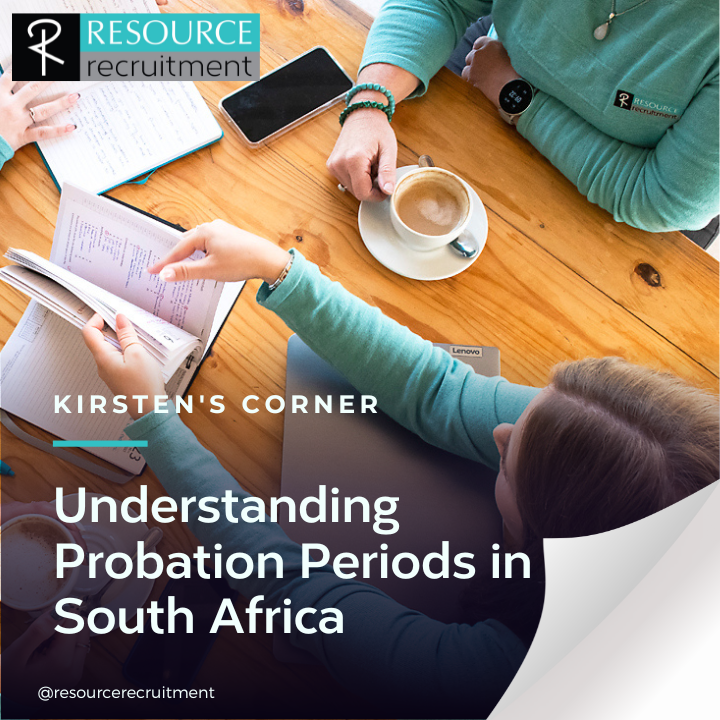
22 Sep Understanding Probation Periods in South Africa
Understanding Probation Periods in South Africa
When entering into a new job, both employers and employees often look for ways to ensure a harmonious and productive working relationship. One crucial aspect of this process is the probation period, a standard practice in many employment contracts in South Africa. In this blog post, we will delve into the details of how probation periods work in South Africa, their purpose, legal framework, and what both employers and employees need to know.
What is a Probation Period?
A probation period is a defined period of time at the beginning of an employment relationship during which the employee’s performance, behavior, and suitability for the role are assessed by the employer. It serves as a trial period for both parties to evaluate whether the employee is a good fit for the job and the company culture.
Purpose of a Probation Period:
The purpose of probation is to give the employer an opportunity to evaluate the employee’s performance before confirming the appointment. Probation should not be used to deprive employees of the status of permanent employment. For example, a practice of dismissing employees who complete their probation periods and replacing them with newly-hired employees, is not consistent with the purpose of probation and constitutes an unfair labour practice.
- Skill and Suitability Assessment: Employers can evaluate whether the employee possesses the required skills, knowledge, and abilities to perform the job effectively.
- Cultural Fit: During the probation period, both the employee and employer can assess whether the employee aligns with the company’s values and culture.
- Behavior and Attitude: Employers can observe the employee’s behavior, attitude, and work ethic to determine if they are a positive addition to the team.
- Training and Development: Employers can provide necessary training and support to help the employee succeed in their role.
- Flexibility: If the employment relationship isn’t working out, either party has the flexibility to terminate the contract without as much paperwork or legal complexity.
What does the law in South Africa say about Probation Periods
Labour Relations Act no.66 of 1995 as amended, section 188 and Item 8 of Schedule: Code of Good Practice -Dismissal discusses probation periods, and how to deal with them legally. (Download both documents by clicking on the links.)
During the probationary period, the employee’s performance should be assessed. An employer should give an employee reasonable evaluation, instruction, training, guidance or counseling in order to allow the employee to render a satisfactory service. If the employer determines that the employee’s performance is below standard, the employer should advise the employee of any aspects in which the employer considers the employee to be failing to meet the required performance standards.
After probation, an employee should not be dismissed for unsatisfactory performance unless the employer has— (a) given the employee appropriate evaluation, instruction, training, guidance or counseling; and (b) after a reasonable period of time for improvement, the employee continues to perform unsatisfactorily.
The procedure leading to dismissal should include an investigation to establish the reasons for the unsatisfactory performance and the employer should consider other ways, short of dismissal, to remedy the matter. (4) In the process, the employee should have the right to be heard.
Duration of Probation Periods:
The period of probation should be determined in advance and be of reasonable duration. The length of the probationary period should be determined with reference to the nature of the job and the time it takes to determine the employee’s suitability for continued employment. A tea lady may only require a month to have her suitability for the role assessed, while a financial manager may require 6 months.
The employer may either extend the probationary period. The period of probation may only be extended for a reason that relates to the purpose of probation.
Notice Period:
During the probation period, notice periods for termination are generally shorter than after the probation period. According to the BCEA, the notice period for termination during probation is typically one week.
Probation periods play a significant role in the employment relationship. They offer a trial period for both employers and employees to assess the suitability of the job and the working environment. Probation periods should be approached with fairness, transparency, and adherence to the principles of labor law. Open communication, clear expectations, and regular feedback are essential for a successful probationary period that benefits both parties involved.
Important Documents on this Topic
Code of Good Practice -Dismissal



